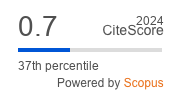Basal cell markers:34BE12 and p63, improving detection of basal cells in atypical prostatic lesions
DOI:
https://doi.org/10.47723/kcmj.v13i2.95Keywords:
BPH ,HG-PIN , prostatic carcinoma , basal cell markers, 34BE12 , HMW-CK , p63Abstract
Background: The diagnosis of prostatic pathology may be of challenging , as some difficult and suspected, atypical cases may lack basal cell layer by routine H&E sections . Antibodies against 34BE12(HMW-CK) and p63 aid the diagnosis of such cases , to distinguish benign from malignant prostatic lesions.
Objective: to identify basal cells in atypical prostatic lesions ,and distinguish benign from malignant prostatic lesions.
Type of the study: A retro-spective study.
Methods: 115cases of paraffin embedded prostatic tissue blocks ,diagnosed as : 76 cases were benign prostatic hyperplasia( BPH) , 9 cases were high grade –prostatic intraepithelial neoplasia (HG-PIN) , and 30 cases were prostatic carcinoma(PCa) .Sections from each blocks were prepared for immunostaining with 34BE12 and p63.
Results : basal cells were detected in cases of BPH , and HG-PIN , and absent in all cases of prostatic carcinoma ,using basal cell markers . Negative benign glands(>2) were found in 71.6% and 38.2% for BPH and 57.1% and 55.6% for HG-PIN immunostained with high molecular weight cytokeratin (34BE12) and p63 , respectively, and significantly reduced to 9.0% and 11.1% for BPH and HG-PIN, respectively with combined using of both markers .Conclusion : Combination of both basal cell markers (34BE12 , p63) improving basal cell detection in atypical ,suspected prostatic lesions and distinguish benign from malignant lesions.













